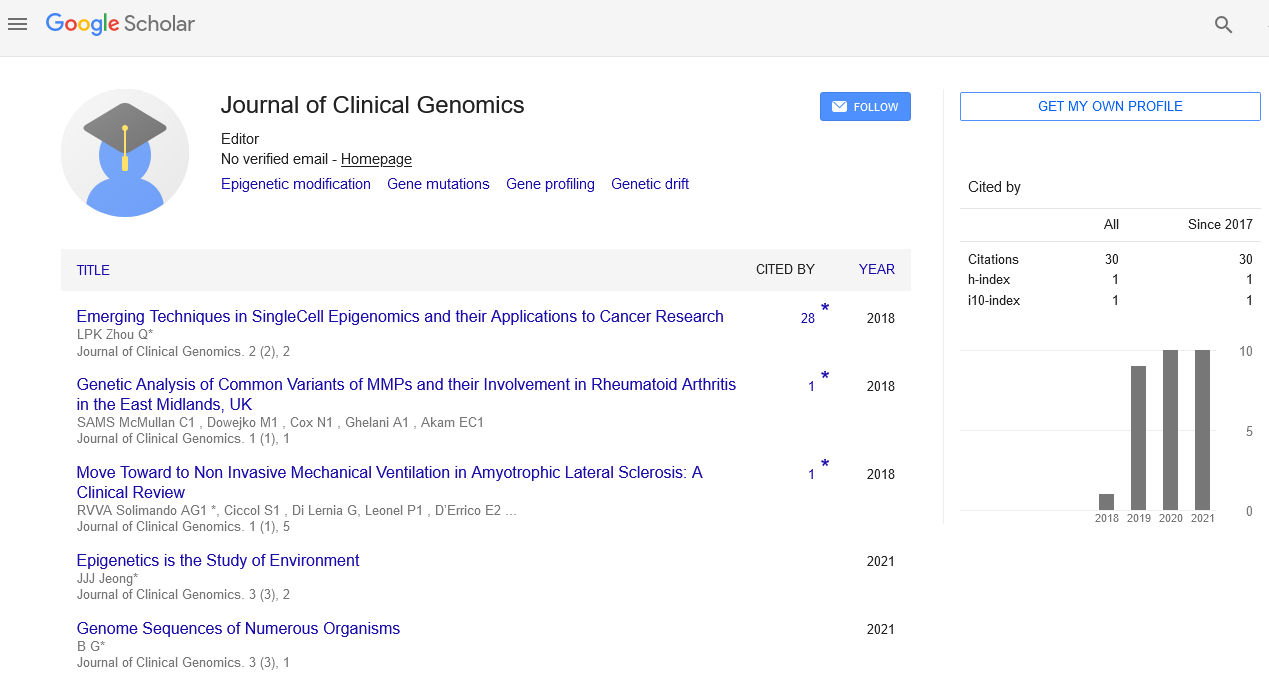Editorial, J Clin Genom Vol: 3 Issue: 5
Community Based Participatory Approaches to Neurogenic Syndrome Research
Joseph Gleeson*
University of California, Departments of Neuroscience and Pediatrics, San Diego, United States
- Corresponding Author:
- Joseph Gleeson
University of California, Departments of Neuroscience and Pediatrics, San Diego, United States
Tel: +15282643746;
E-mail: gleeson27@gmail.com
Received date: 07 December, 2021; Accepted date: 22 December, 2021; Published date: 30 December, 2021
Keywords: Gene mutations, Gene profiling, Genetic drift, Genetic Mutation
Editorial Note
Specialists in the Neurogenic Diseases Program, part of the University of Michigan Health System give opinion and comprehensive care for individualities and families with inherited and degenerative neurological diseases. Cases and their family members are appertained from around the world by primary care croakers, neurologists and public associations. Individualities seeking evaluation can also communicate our clinic directly. Our devoted platoon of professionals has world- class moxie in neurogenesis diseases both in treating subjects with these conditions and performing laboratory exploration to advance knowledge of these diseases and develop better treatments. Judgments are established by reviewing medical records, studying the family history, canvassing and examining affected individualities, and carrying fresh testing as demanded similar as inheritable testing and neuro imaging. Following opinion, treatment plans and long term follow-up are established. Individualities and their family members are handed information about the complaint, inheritable comforting, and referrals for fresh information including complaint-specific support groups. As requested, openings to share in clinical and introductory exploration studies are bandied. Molecular opinion in these diseases is grounded on the direct examination of the shifted gene by styles similar as single- beachfront conformation polymorphism analysis, denaturing grade gel electrophoresis, and direct DNA sequencing. In numerous neurogenesis diseases the complaint gene has not yet been linked. Then molecular opinion relies on circular approaches grounded on styles similar as the analysis of relation and of allelic association.
Symptoms
There are numerous different types of neurogenesis diseases. While these conditions are embedded in inheritable changes, not all of them are inherited. Types of neurogenic diseases include autism diapason complaint, brain deformations, experimental detention, Intellectual and cognitive disability epilepsy and seizures. Symptoms of neurogenic diseases may be veritably much the same as those caused by no genetic neurologic problems. A multidisciplinary platoon of pediatric specialists in neurology, neurosurgery, genetics and neonatology treat neurogenic diseases at Riley at IU Health. Depending on the specific neurogenic condition, your child may need services from fresh specialists, including experts in audiology, endocrinology, feeding diseases, ophthalmology, pain operation, physical and occupational remedy, psychiatry and psychology, recuperation drug and speech pathology. Clinical history and test. Your child’s croaker takes a detailed history, including an in- depth family history, and will examine your child’s body, looking for signs of a neurogenic complaint, similar as certain blots or unusual physical or neurologic features. Blood tests. These may be routine chemistries, blood counts or further technical metabolic testing that would point to a specific complaint. Urine tests. Urine tests can also check for specific chemicals and proteins in the urine that indicate a neurogenic complaint, replacing further invasive testing. Lumbar perforation still, a lumbar perforation to gain cerebrospinal fluid may be helpful, If blood and urine testing are inconclusive. A neurogenic complaint is defined as a clinical complaint caused by a disfigurement in one or further genes which affect the isolation and function of the neuroectoderm and its derivations. Inheritable findings in colorful neurogenic diseases are bandied. Huntington complaint, spin bulbar muscular atrophy, and the autosomal dominant cerebellar ataxias are exemplifications of autosomal dominant diseases caused by the expansion of trinucleotides within complaint genes. The CAG expansions appear to affect in a gain of gene function. Antenatal, presymptomatic, and discrimination individual tests are grounded on the discovery of the reprise expansions. Point mutations within complaint genes affect in numerous fresh neurogenic diseases. An autosomal dominant form of amyotrophic side sclerosis and colorful types of craniosynostotic runs are described. The mutations in the complaint genes also appear to affect in a gain of gene function.
 Spanish
Spanish  Chinese
Chinese  Russian
Russian  German
German  French
French  Japanese
Japanese  Portuguese
Portuguese  Hindi
Hindi 